(新课标)Unit 9 Section A (3a-3c) 课件(人教新目标八下Unit 9 Have you ever been to a museum?)
文档属性
| 名称 | (新课标)Unit 9 Section A (3a-3c) 课件(人教新目标八下Unit 9 Have you ever been to a museum?) | 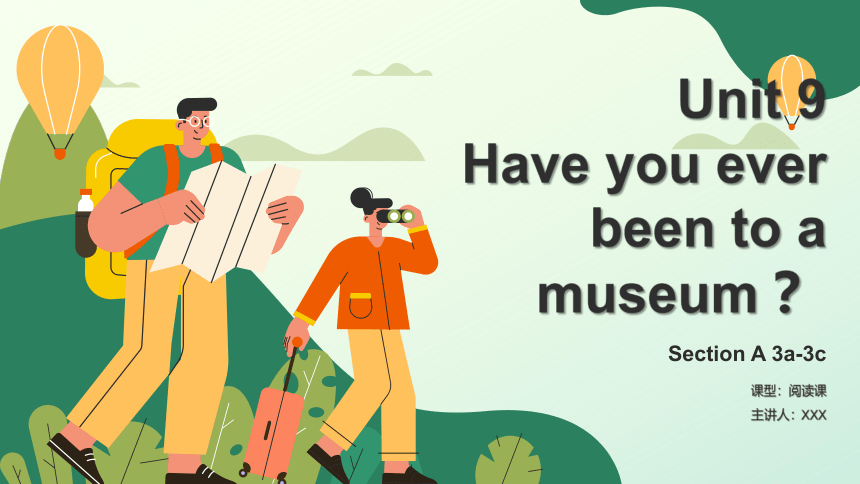 | |
| 格式 | pptx | ||
| 文件大小 | 52.0MB | ||
| 资源类型 | 试卷 | ||
| 版本资源 | 人教新目标(Go for it)版 | ||
| 科目 | 英语 | ||
| 更新时间 | 2024-04-16 14:31:32 | ||
图片预览

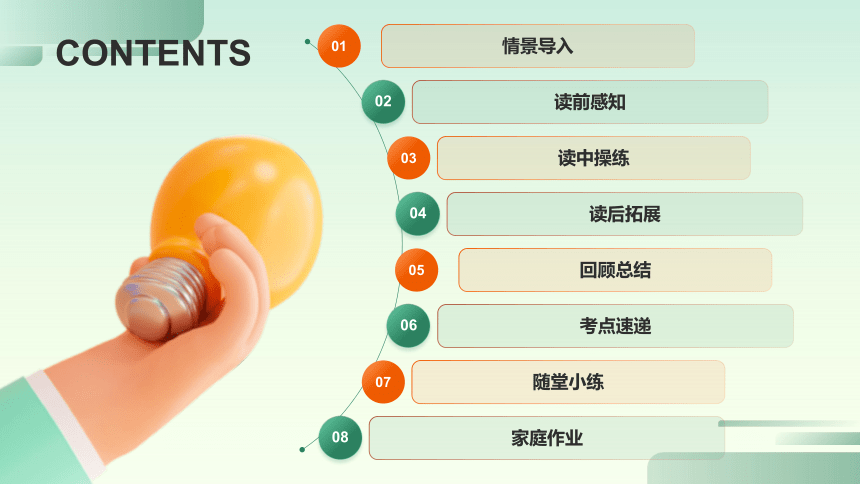
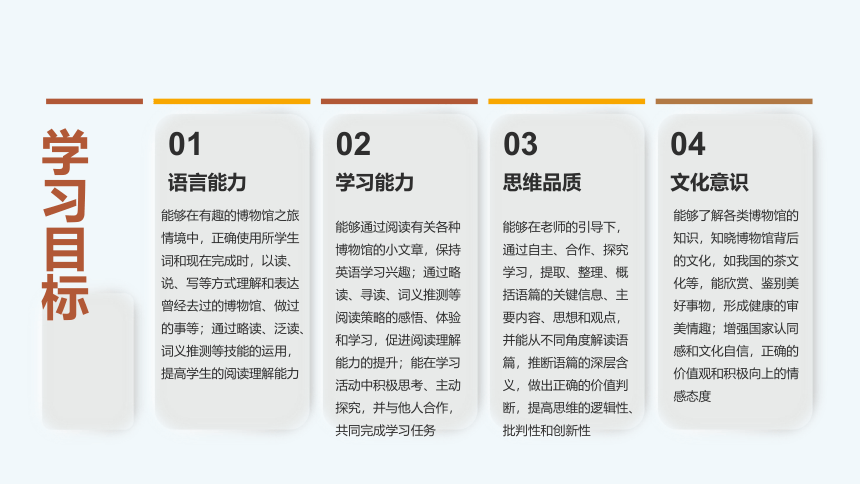

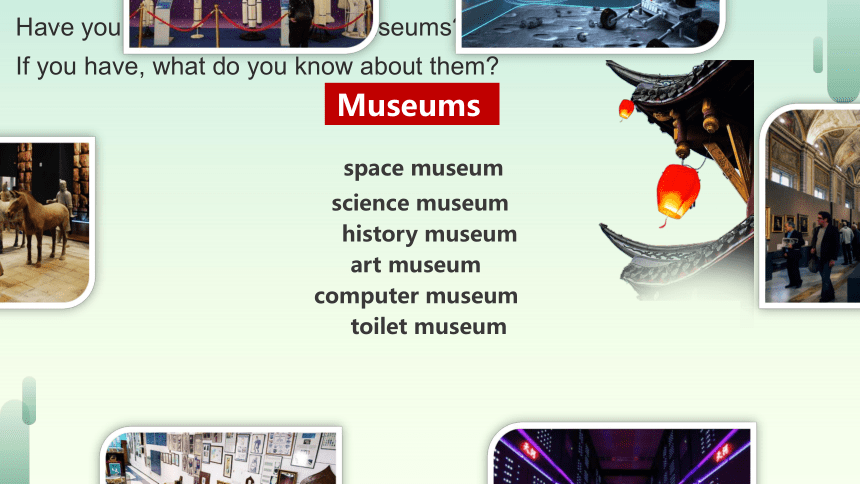
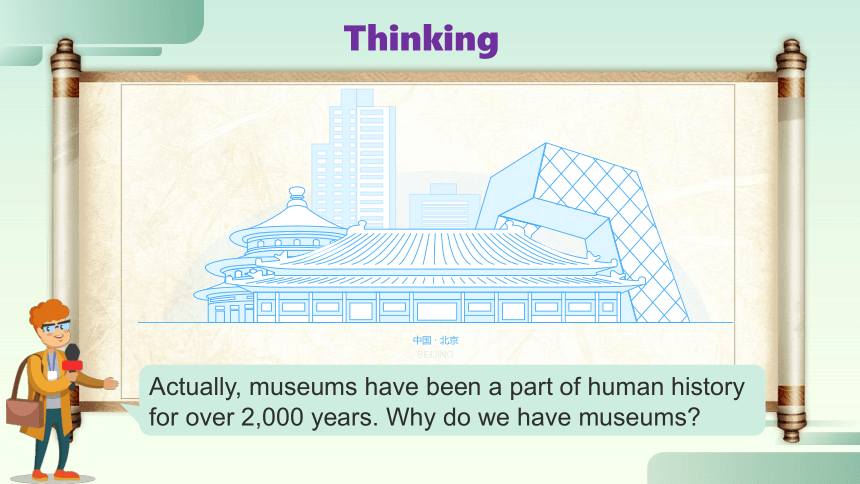
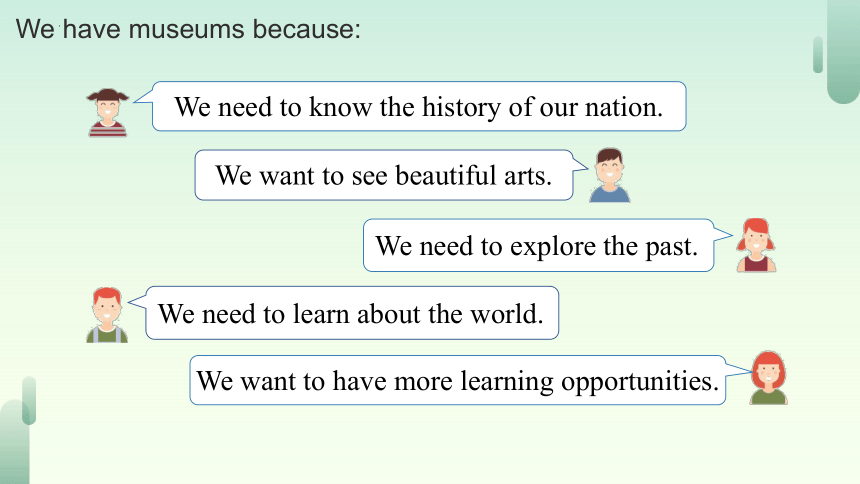

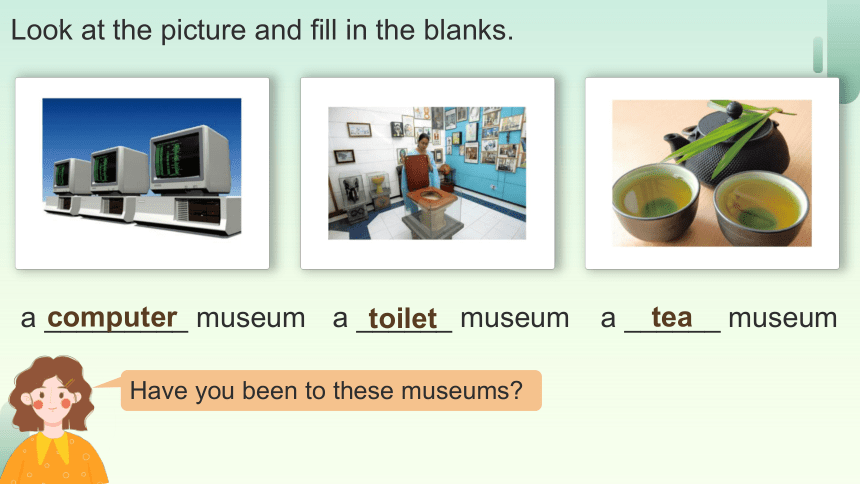



文档简介
(共44张PPT)
Section A 3a-3c
课型:阅读课
主讲人:XXX
Unit 9
Have you ever been to a museum ?
读前感知
02
读中操练
03
情景导入
01
读后拓展
04
CONTENTS
考点速递
06
随堂小练
07
回顾总结
05
家庭作业
08
学习目标
01
语言能力
能够在有趣的博物馆之旅情境中,正确使用所学生词和现在完成时,以读、说、写等方式理解和表达曾经去过的博物馆、做过的事等;通过略读、泛读、词义推测等技能的运用,提高学生的阅读理解能力
03
思维品质
能够在老师的引导下,通过自主、合作、探究学习,提取、整理、概括语篇的关键信息、主要内容、思想和观点,并能从不同角度解读语篇,推断语篇的深层含义,做出正确的价值判断,提高思维的逻辑性、批判性和创新性
04
文化意识
能够了解各类博物馆的知识,知晓博物馆背后的文化,如我国的茶文化等,能欣赏、鉴别美好事物,形成健康的审美情趣;增强国家认同感和文化自信,正确的价值观和积极向上的情感态度
02
学习能力
能够通过阅读有关各种博物馆的小文章,保持英语学习兴趣;通过略读、寻读、词义推测等阅读策略的感悟、体验和学习,促进阅读理解能力的提升;能在学习活动中积极思考、主动探究,并与他人合作,共同完成学习任务
01 情景导入
Scenario import
Have you ever been to these museums
If you have, what do you know about them
Museums
space museum
science museum
history museum
art museum
computer museum
toilet museum
Thinking
Actually, museums have been a part of human history for over 2,000 years. Why do we have museums
中国 · 北京
BEIJING
We have museums because:
We need to know the history of our nation.
We want to see beautiful arts.
We need to explore the past.
We need to learn about the world.
We want to have more learning opportunities.
02读前感知
Before reading
Look at the picture and fill in the blanks.
Have you been to these museums
a _________ museum
a ______ museum
a ______ museum
computer
toilet
tea
What does the article talk about
Look at the title and pictures.
Three interesting museums.
03 读中操练
While reading
Read the passage quickly and match the name with each museum.
Amy
Linlin
Ken
Read the article quickly and answer the questions.
1.Which three museums do the
students talk about
Key words
The International Museum of Toilets
The Hangzhou National Tea Museum
the American Computer Museum
3a
Read Para.1 and fill in the blanks.
Name What the Musum exhibits What students have learned Students’ feelings / ideas /
decisions
the American Computer Museum
different computers and who invented them
The old computers were much bigger.
A special computer could play chess even better than humans.
unbelievable
Technology has progressed in such a rapid way.
Watch the video and learn more about it.
Read the Para.2 and answer the questions.
1.What does Amy think of it
unusual.
many different kinds of toilets
the history and development of toilets
2.What did Amy see
3. What did Amy learn
Why do Indians build the museum
Read para 2 and fill in the blanks.
Name What the Musum exhibits What students have learned Students’ feelings / ideas /
decisions
the International Museum of Toilet
many different kinds of toilets
the history and development of toilets
encourage governments and social groups to think about ways to improve toilets in the future
Watch the video and learn more about it.
Read Para.3 carefully and judge T and F.
( )1.Watching the tea preparation is more enjoyable than drinking the tea itself.
( )2.Linlin's grandpa loves drinking tea but he doesn't like collecting tea sets.
( )3.Linlin likes watching the tea art performances.
F
F
T
Name What the Musum exhibits What students have learned Students’ feelings / ideas /
decisions
the Hangzhou National Tea Museum
tea, tea sets, the tea art performances
how to make a perfect cup of tea with beautiful tea sets
relaxing and peaceful;
Watching the tea preparation is just as enjoyable as drinking the tea itself.
Read para 3 and fill in the blanks.
Read the article again and answer the questions.
1. What does Ken say about the American Computer Museum
2. What can we learn at the International Museum of Toilets
3. Why is the Hangzhou National Tea Museum a nice place to
enjoy tea
He says that it is the most interesting museum he has ever been to.
We can learn the history and development of toilets.
Because it’s near a lake and it has beautiful tea art performances.
3c
Which of the underlined words in the passage have the following meanings
3c
make (something) better —
become better —
uncommon —
quiet —
made —
quick —
peaceful
improve
have progressed
unusual
rapid
invented
阅读策略:根据上下文已知信息推测词意
04 读后拓展
After reading
What do you think is the most interesting thing about each museum Why
Try to retell the article with the help of the chart .
Names Museums How What have they seen What they have learned
Ken _______ Interesting (1) different ________(old and new) (2) a special computer that could __________ even better than humans __________ has progressed in such a rapid way.
Amy the International Museum of Toilets ______ many different kinds of ________ About the ________ and development of toilets.
Linlin the Hangzhou National Tea Museum ______ (1)tea art ________ (2)beautiful ________ How to _________
____________ with beautiful tea sets.
computers
the American Computer Museum
play chess
Technology
Unusual
toilets
history
Relaxing and peaceful
performances
tea sets
make a perfect cup of tea
Have you ever been to somewhere interesting
Where
When
How
What
What
Yes,I have.I went to ...last month.
What do you think of the ...
What did you see and learn there
How was the ...
Have you been to any interesting places
This article is a travel note. Think what should be included in a travel note Tick the right items and add more.
A travel note include:
who the person was where the person went
when the person went there what the person saw
what the person did how the person felt
what the person learned why the person went there
You can add more:
___________________________________________________
___________________________________________________
(answers may various)
Design a museum with your imagination in your group and try to help group members solve difficulties. You could draw your design if possible.
Name What the museum exhibits What students can learn Your decision
05 回顾总结
Summary
Summary
New words
Reading
invent unbelievable social rapid unusual toilet
make progress in encourage sb. to do sth./in sth.
collection
Three students talk about the museums they’ve been to.
the American Computer Museum
the Hangzhou National Tea Museum
peaceful tea art performance perfect tea set itself
progress encourage collect
Expressions
collector
the International Museum of Toilets
06考点速递
Language points
Language Points
unbelievable adj. 难以置信的;不真实的
Point1
1. It's unbelievable that technology has progressed in such a rapid way! (教材P67 3a)
unbelievable 由“否定前缀 un- + believable”构成,其反义词是 believable“可信的”。
The story you told us is so unbelievable.
【拓展延伸】由否定前缀un-构成的其他常见词汇:
unhappy(不幸福的),unlucky(不幸的),unfriendly(不友好的),unknown(不知名的),unfair(不公平的)
Language Points
progress v. & n. 进步;进展
Point2
1. It's unbelievable that technology has progressed in such a rapid way! (教材P67 3a)
① progress 在此处作不及物动词。
I asked the nurse how my father was progressing.
② progress 还可作不可数名词,常用 much,great,rapid 等形容词修饰。make progress in 表示“在……方面取得进步”。
We have made great progress in learning English.
Language Points
rapid adj. 迅速的;快速的
Point3
1. It's unbelievable that technology has progressed in such a rapid way! (教材P67 3a)
rapid作形容词,其副词形式为rapidly,意为“迅速地;快速地”。
With the rapid development of science and technology, China has entered a new era.
With Cai Lun's papermaking method, Chinese culture grew more rapidly over the next several centuries.
Language Points
encourage v. 鼓励
Point1
2. It also encourages governments and social groups to think about ways to improve toilets in the future. (教材P67 3a)
encourage 作动词,常用结构有:
encourage
encourage sb. to do sth. 鼓励某人做某事
encourage sb. in … 在……方面鼓励某人
Mary's teacher often encourages her to be positive.
My father encouraged me in my dream to be a model.
【拓展延伸】encouragement作名词,意为“鼓励;起激励作用的事物”。
With encouragement, Sally is starting to play with the other children.
Language Points
social adj. 社会的
Point2
2. It also encourages governments and social groups to think about ways to improve toilets in the future. (教材P67 3a)
social作形容词,常用在名词前作定语。
We should treat some social problems reasonably.
【拓展延伸】social的名词形式为society,意为“社会”。
Nowadays, the education of safety has caught the attention of the whole society.
Language Points
perfect adj. 完美的;完全的
Point
3. The tea art performances show how to make a perfect cup of tea with beautiful tea sets. (教材P67 3a)
perfect 读音 [ p (r)f kt],不要读成 [p fekt]。perfect无比较级和最高级形式。类似地,excellent,favorite也只用原级。
Practice makes perfect. 熟能生巧。
Nobody is perfect. 人无完人。
Language Points
collect v. 收集;采集
Point
4. I've finally realized why my grandpa loves drinking tea and collecting tea sets. (教材P67 3a)
I like collecting stamps while my brother likes collecting coins.
【拓展延伸】collect 的相关词:
collect v. 收集;采集
collection n. 收藏;收藏品
collector n. 收藏家
The famous collector has collected many things in the past fifty years. His collections are priceless.
07 随堂小练
Exercise
【2020·牡丹江、鸡西地区】With the help of Ms. White, I've made great ________ in my spoken English.
A. mistake B. decision C. progress
— How do you like this plan
— _______! It’s just what I’ve been expecting.
A. Perfect B. Terrible C. Meaningless D. Awful
【2020·丹东市】—Mum, where is dad
—He ________ the supermarket.
A. was going to B. has gone to C. has been to D. is going to
1
C
A
2
B
3
一、单项选择
二、根据句意及首字母或汉语提示完成句子。
【2020 湖南省常德市】The telephone (invent) by Alexander Graham Bell in 1876.
Our teacher always e__________ us to solve problems by ourselves.
This is only a s________ group, not a government organization(组织).
1
2
3
was invented
ncourages
ocial
No one is p________. We always have this or that shortcoming(缺点).
I hope all the people can live in a p________ world, no war anymore.
【2020 四川省成都市】It's u that he has been independent now under his mom's overprotection.
4
5
6
erfect
eaceful
nbelievable
08家庭作业
homework
Homework
Level A: Choose a museum you like and introduce it to others. You can write from these aspects: name, where, description, the most interesting thing, and what you can learn.
Level B: Draw a mind-map of the article in 3a and tell the three museums to your family and friends.
Thank you for listening!
Section A 3a-3c
课型:阅读课
主讲人:XXX
Unit 9
Have you ever been to a museum ?
读前感知
02
读中操练
03
情景导入
01
读后拓展
04
CONTENTS
考点速递
06
随堂小练
07
回顾总结
05
家庭作业
08
学习目标
01
语言能力
能够在有趣的博物馆之旅情境中,正确使用所学生词和现在完成时,以读、说、写等方式理解和表达曾经去过的博物馆、做过的事等;通过略读、泛读、词义推测等技能的运用,提高学生的阅读理解能力
03
思维品质
能够在老师的引导下,通过自主、合作、探究学习,提取、整理、概括语篇的关键信息、主要内容、思想和观点,并能从不同角度解读语篇,推断语篇的深层含义,做出正确的价值判断,提高思维的逻辑性、批判性和创新性
04
文化意识
能够了解各类博物馆的知识,知晓博物馆背后的文化,如我国的茶文化等,能欣赏、鉴别美好事物,形成健康的审美情趣;增强国家认同感和文化自信,正确的价值观和积极向上的情感态度
02
学习能力
能够通过阅读有关各种博物馆的小文章,保持英语学习兴趣;通过略读、寻读、词义推测等阅读策略的感悟、体验和学习,促进阅读理解能力的提升;能在学习活动中积极思考、主动探究,并与他人合作,共同完成学习任务
01 情景导入
Scenario import
Have you ever been to these museums
If you have, what do you know about them
Museums
space museum
science museum
history museum
art museum
computer museum
toilet museum
Thinking
Actually, museums have been a part of human history for over 2,000 years. Why do we have museums
中国 · 北京
BEIJING
We have museums because:
We need to know the history of our nation.
We want to see beautiful arts.
We need to explore the past.
We need to learn about the world.
We want to have more learning opportunities.
02读前感知
Before reading
Look at the picture and fill in the blanks.
Have you been to these museums
a _________ museum
a ______ museum
a ______ museum
computer
toilet
tea
What does the article talk about
Look at the title and pictures.
Three interesting museums.
03 读中操练
While reading
Read the passage quickly and match the name with each museum.
Amy
Linlin
Ken
Read the article quickly and answer the questions.
1.Which three museums do the
students talk about
Key words
The International Museum of Toilets
The Hangzhou National Tea Museum
the American Computer Museum
3a
Read Para.1 and fill in the blanks.
Name What the Musum exhibits What students have learned Students’ feelings / ideas /
decisions
the American Computer Museum
different computers and who invented them
The old computers were much bigger.
A special computer could play chess even better than humans.
unbelievable
Technology has progressed in such a rapid way.
Watch the video and learn more about it.
Read the Para.2 and answer the questions.
1.What does Amy think of it
unusual.
many different kinds of toilets
the history and development of toilets
2.What did Amy see
3. What did Amy learn
Why do Indians build the museum
Read para 2 and fill in the blanks.
Name What the Musum exhibits What students have learned Students’ feelings / ideas /
decisions
the International Museum of Toilet
many different kinds of toilets
the history and development of toilets
encourage governments and social groups to think about ways to improve toilets in the future
Watch the video and learn more about it.
Read Para.3 carefully and judge T and F.
( )1.Watching the tea preparation is more enjoyable than drinking the tea itself.
( )2.Linlin's grandpa loves drinking tea but he doesn't like collecting tea sets.
( )3.Linlin likes watching the tea art performances.
F
F
T
Name What the Musum exhibits What students have learned Students’ feelings / ideas /
decisions
the Hangzhou National Tea Museum
tea, tea sets, the tea art performances
how to make a perfect cup of tea with beautiful tea sets
relaxing and peaceful;
Watching the tea preparation is just as enjoyable as drinking the tea itself.
Read para 3 and fill in the blanks.
Read the article again and answer the questions.
1. What does Ken say about the American Computer Museum
2. What can we learn at the International Museum of Toilets
3. Why is the Hangzhou National Tea Museum a nice place to
enjoy tea
He says that it is the most interesting museum he has ever been to.
We can learn the history and development of toilets.
Because it’s near a lake and it has beautiful tea art performances.
3c
Which of the underlined words in the passage have the following meanings
3c
make (something) better —
become better —
uncommon —
quiet —
made —
quick —
peaceful
improve
have progressed
unusual
rapid
invented
阅读策略:根据上下文已知信息推测词意
04 读后拓展
After reading
What do you think is the most interesting thing about each museum Why
Try to retell the article with the help of the chart .
Names Museums How What have they seen What they have learned
Ken _______ Interesting (1) different ________(old and new) (2) a special computer that could __________ even better than humans __________ has progressed in such a rapid way.
Amy the International Museum of Toilets ______ many different kinds of ________ About the ________ and development of toilets.
Linlin the Hangzhou National Tea Museum ______ (1)tea art ________ (2)beautiful ________ How to _________
____________ with beautiful tea sets.
computers
the American Computer Museum
play chess
Technology
Unusual
toilets
history
Relaxing and peaceful
performances
tea sets
make a perfect cup of tea
Have you ever been to somewhere interesting
Where
When
How
What
What
Yes,I have.I went to ...last month.
What do you think of the ...
What did you see and learn there
How was the ...
Have you been to any interesting places
This article is a travel note. Think what should be included in a travel note Tick the right items and add more.
A travel note include:
who the person was where the person went
when the person went there what the person saw
what the person did how the person felt
what the person learned why the person went there
You can add more:
___________________________________________________
___________________________________________________
(answers may various)
Design a museum with your imagination in your group and try to help group members solve difficulties. You could draw your design if possible.
Name What the museum exhibits What students can learn Your decision
05 回顾总结
Summary
Summary
New words
Reading
invent unbelievable social rapid unusual toilet
make progress in encourage sb. to do sth./in sth.
collection
Three students talk about the museums they’ve been to.
the American Computer Museum
the Hangzhou National Tea Museum
peaceful tea art performance perfect tea set itself
progress encourage collect
Expressions
collector
the International Museum of Toilets
06考点速递
Language points
Language Points
unbelievable adj. 难以置信的;不真实的
Point1
1. It's unbelievable that technology has progressed in such a rapid way! (教材P67 3a)
unbelievable 由“否定前缀 un- + believable”构成,其反义词是 believable“可信的”。
The story you told us is so unbelievable.
【拓展延伸】由否定前缀un-构成的其他常见词汇:
unhappy(不幸福的),unlucky(不幸的),unfriendly(不友好的),unknown(不知名的),unfair(不公平的)
Language Points
progress v. & n. 进步;进展
Point2
1. It's unbelievable that technology has progressed in such a rapid way! (教材P67 3a)
① progress 在此处作不及物动词。
I asked the nurse how my father was progressing.
② progress 还可作不可数名词,常用 much,great,rapid 等形容词修饰。make progress in 表示“在……方面取得进步”。
We have made great progress in learning English.
Language Points
rapid adj. 迅速的;快速的
Point3
1. It's unbelievable that technology has progressed in such a rapid way! (教材P67 3a)
rapid作形容词,其副词形式为rapidly,意为“迅速地;快速地”。
With the rapid development of science and technology, China has entered a new era.
With Cai Lun's papermaking method, Chinese culture grew more rapidly over the next several centuries.
Language Points
encourage v. 鼓励
Point1
2. It also encourages governments and social groups to think about ways to improve toilets in the future. (教材P67 3a)
encourage 作动词,常用结构有:
encourage
encourage sb. to do sth. 鼓励某人做某事
encourage sb. in … 在……方面鼓励某人
Mary's teacher often encourages her to be positive.
My father encouraged me in my dream to be a model.
【拓展延伸】encouragement作名词,意为“鼓励;起激励作用的事物”。
With encouragement, Sally is starting to play with the other children.
Language Points
social adj. 社会的
Point2
2. It also encourages governments and social groups to think about ways to improve toilets in the future. (教材P67 3a)
social作形容词,常用在名词前作定语。
We should treat some social problems reasonably.
【拓展延伸】social的名词形式为society,意为“社会”。
Nowadays, the education of safety has caught the attention of the whole society.
Language Points
perfect adj. 完美的;完全的
Point
3. The tea art performances show how to make a perfect cup of tea with beautiful tea sets. (教材P67 3a)
perfect 读音 [ p (r)f kt],不要读成 [p fekt]。perfect无比较级和最高级形式。类似地,excellent,favorite也只用原级。
Practice makes perfect. 熟能生巧。
Nobody is perfect. 人无完人。
Language Points
collect v. 收集;采集
Point
4. I've finally realized why my grandpa loves drinking tea and collecting tea sets. (教材P67 3a)
I like collecting stamps while my brother likes collecting coins.
【拓展延伸】collect 的相关词:
collect v. 收集;采集
collection n. 收藏;收藏品
collector n. 收藏家
The famous collector has collected many things in the past fifty years. His collections are priceless.
07 随堂小练
Exercise
【2020·牡丹江、鸡西地区】With the help of Ms. White, I've made great ________ in my spoken English.
A. mistake B. decision C. progress
— How do you like this plan
— _______! It’s just what I’ve been expecting.
A. Perfect B. Terrible C. Meaningless D. Awful
【2020·丹东市】—Mum, where is dad
—He ________ the supermarket.
A. was going to B. has gone to C. has been to D. is going to
1
C
A
2
B
3
一、单项选择
二、根据句意及首字母或汉语提示完成句子。
【2020 湖南省常德市】The telephone (invent) by Alexander Graham Bell in 1876.
Our teacher always e__________ us to solve problems by ourselves.
This is only a s________ group, not a government organization(组织).
1
2
3
was invented
ncourages
ocial
No one is p________. We always have this or that shortcoming(缺点).
I hope all the people can live in a p________ world, no war anymore.
【2020 四川省成都市】It's u that he has been independent now under his mom's overprotection.
4
5
6
erfect
eaceful
nbelievable
08家庭作业
homework
Homework
Level A: Choose a museum you like and introduce it to others. You can write from these aspects: name, where, description, the most interesting thing, and what you can learn.
Level B: Draw a mind-map of the article in 3a and tell the three museums to your family and friends.
Thank you for listening!
同课章节目录
- Unit 1 What's the matter?
- Section A
- Section B
- Unit 2 I'll help to clean up the city parks.
- Section A
- Section B
- Unit 3 Could you please clean your room?
- Section A
- Section B
- Unit 4 Why don't you talk to your parents?
- Section A
- Section B
- Unit 5 What were you doing when the rainstorm came
- Section A
- Section B
- Review of Units 1-5
- Unit 6 An old man tried to move the mountains.
- Section A
- Section B
- Unit 7 What's the highest mountain in the world?
- Section A
- Section B
- Unit 8 Have you read Treasure Island yet?
- Section A
- Section B
- Unit 9 Have you ever been to a museum?
- Section A
- Section B
- Unit 10 I've had this bike for three years.
- Section A
- Section B
